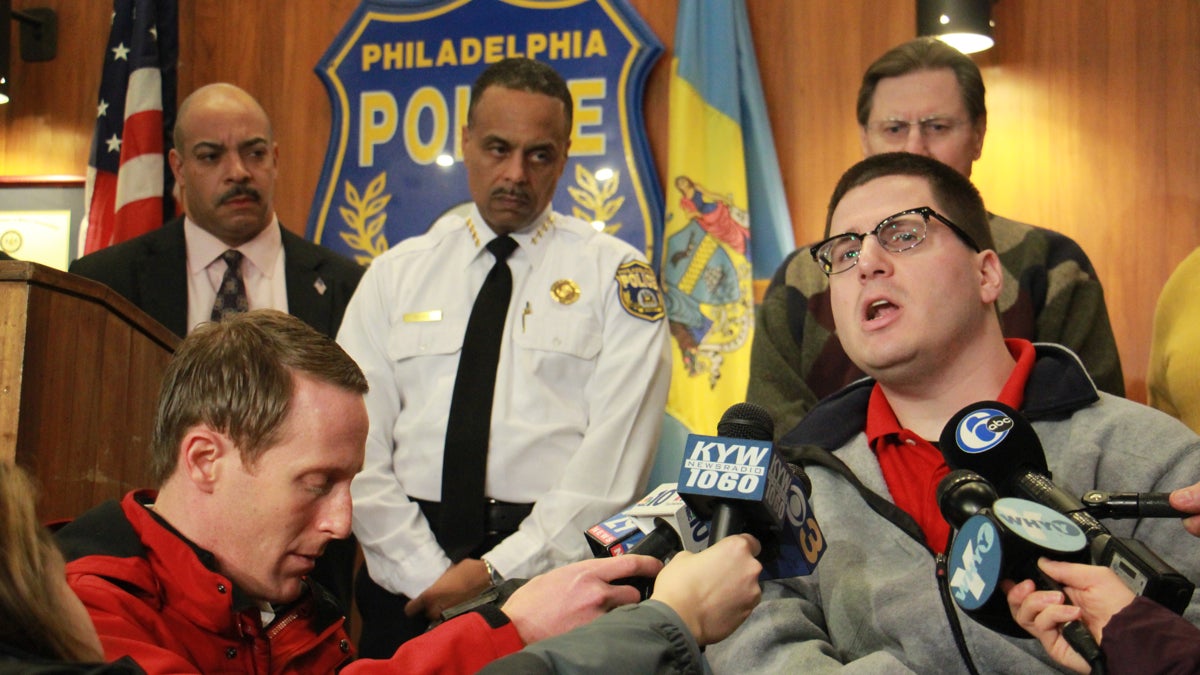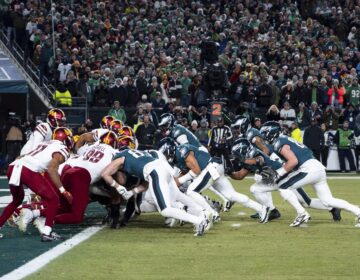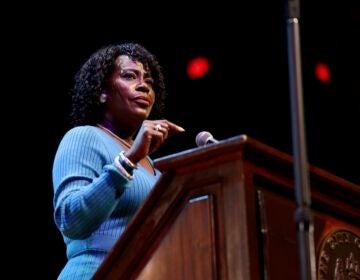Philly officials warn of dangers, consequences of New Year’s Eve gunfire

Joe Jaskolka (right), who was shot in the head by a stray bullet on New Year's Eve, 1998 when he was 11 years old, tells reporters about his struggles in an effort to discourage Philadelphians from firing guns in celebration of the New Year. (Emma Lee/WHYY)
North Philadelphia resident Ruth Birchett has been fighting the tradition of shooting guns into the air on New Year’s Eve since 1997.
That’s the year she started a community center out of her home where she served meals to the elderly.
“And all the elders, when they come to pick up the food, they were just so horrified and talking about wanting to be in church when the New Year comes in,” Birchett said. “But they don’t go to church anymore because they’re afraid. They can go to the church early, but it’s leaving the church and the gun fire’s still going on, so actively going on in our community.”
For several years since, Birchett has been working with Philadelphia law enforcement to spread the word about the dangers of celebratory — and illegal — gunfire during an annual press conference.
“There are citizens that have checked their behavior and we don’t have the amount of gunfire that we used to have … so the message is getting out,” Birchett said Thursday from a podium at Philadelphia Police Department headquarters on Race Street.
Last New Year’s Eve, city police received 132 reports of gunfire over the course of four hours, compared to 10 reports on a typical night. That’s up from New Year’s Eve 2014 when police received 78 calls of gunshots.
District Attorney Seth Williams said anyone caught firing shots will be charged with reckless endangerment “and receive several years in prison.”
“If the bullet hits and hurts someone, you could be charged with aggravated assault, attempted murder or even murder,” Williams said.
Delaware resident Joe Jaskolka knows what being hit by a celebratory bullet is like. In fact, the one that hit him on New Year’s Eve 1998 is still lodged in his head.
Jaskolka was 11 years old at the time and visiting his grandparents in South Philadelphia. The family was outside banging on pots and pans to celebrate the arrival of 1999.
Jaskolka and his cousin were walking down the block from his grandmother’s house when the bullet struck.
Jaskolka, who didn’t hear it coming, wound up on the ground, bleeding from his head.
“They said it could have came from as far away as Camden, New Jersey,” said Jaskolka, now 29.
Over the years, Jaskolka has had 53 surgeries to his brain and eyes. He has been unable to walk since 2005. Once an athlete, Jaskolka can no longer throw a tight spiral with a football, but he’s determined to get his degree in criminal justice from Delaware Technical Community College.
And he continues traveling to Philadelphia every year to share his story — his friend Ruth Birchett often by his side.
“People need to put the guns away. You’re killing the citizens,” Jaskolka said. “I mean, why the bloodshed any more? This happens all over. Why?”
WHYY is your source for fact-based, in-depth journalism and information. As a nonprofit organization, we rely on financial support from readers like you. Please give today.




